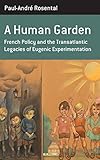A Human Garden : French Policy and the Transatlantic Legacies of Eugenic Experimentation / Paul-André Rosental.
Material type: TextSeries: Berghahn Monographs in French Studies ; 16Publisher: New York ; Oxford : Berghahn Books, [2019]Copyright date: ©2019Description: 1 online resource (248 p.)Content type:
TextSeries: Berghahn Monographs in French Studies ; 16Publisher: New York ; Oxford : Berghahn Books, [2019]Copyright date: ©2019Description: 1 online resource (248 p.)Content type: - 9781789205435
- 9781789205442
- Eugenics -- France -- Strasbourg -- History -- 20th century
- Garden cities -- France -- Strasbourg -- History -- 20th century
- HISTORY / Europe / France
- alfred sauvy
- biology
- childbearing
- childbirth
- children
- contemporary
- democratic
- developmental psychology
- eugenics
- experiment
- forgotten history
- france
- frederick osborn
- garden
- guinea pigs
- human evolution
- john stuart mill
- liberal
- master race
- modern history
- morals
- philosophy
- postwar
- problematic
- procreation
- pseudoscience
- racism
- research
- scholarly
- scientific
- social studies
- strasbourg
- theorists
- true story
- ungemach
- 363.9/209443954 23
- online - DeGruyter
| Item type | Current library | Call number | URL | Status | Notes | Barcode | |
|---|---|---|---|---|---|---|---|
 eBook
eBook
|
Biblioteca "Angelicum" Pont. Univ. S.Tommaso d'Aquino Nuvola online | online - DeGruyter (Browse shelf(Opens below)) | Online access | Not for loan (Accesso limitato) | Accesso per gli utenti autorizzati / Access for authorized users | (dgr)9781789205442 |
Frontmatter -- Contents -- List of Illustrations -- Foreword -- List of Abbreviations -- Introduction -- Part I. The Intellectual and Political History of a Human Garden (1880s–1980s) -- Part II. Eugenics, Biopolitics and Welfare in a Transatlantic Perspective (1914–1968) -- Part III. Eugenics and Developmental Psychology: A Neglected Legacy -- Conclusion -- Epilogue. Forgetting Eugenics: Back to the Ungemach Gardens -- Appendix. Works by Abel Ruffenach, Pseudonym of Alfred Dachert -- Archival Sources -- Bibliography -- Index of Names -- Index of Subjects and Institutions
restricted access online access with authorization star
http://purl.org/coar/access_right/c_16ec
Well into the 1980s, Strasbourg, France, was the site of a curious and little-noted experiment: Ungemach, a garden city dating back to the high days of eugenic experimentation that offered luxury living to couples who were deemed biologically fit and committed to contractual childbearing targets. Supported by public authorities, Ungemach aimed to accelerate human evolution by increasing procreation among eugenically selected parents. In this fascinating history, Paul-André Rosental gives an account of Ungemach’s origins and its perplexing longevity. He casts a troubling light on the influence that eugenics continues to exert—even decades after being discredited as a pseudoscience—in realms as diverse as developmental psychology, postwar policymaking, and liberal-democratic ideals of personal fulfilment.
Mode of access: Internet via World Wide Web.
In English.
Description based on online resource; title from PDF title page (publisher's Web site, viewed 25. Jun 2024)


